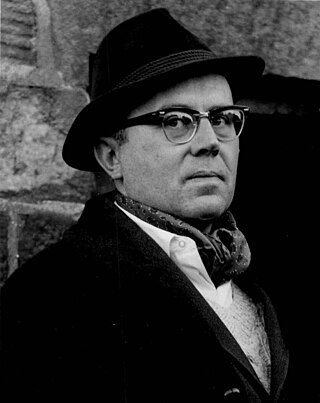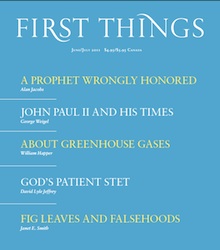Related Research Articles

National Review is an American conservative right-libertarian editorial magazine, focusing on news and commentary pieces on political, social, and cultural affairs. The magazine was founded by the author William F. Buckley Jr. in 1955. Its editor-in-chief is Rich Lowry, and its editor is Ramesh Ponnuru.
Paleoconservatism is a political philosophy and strain of conservatism in the United States stressing American nationalism, Christian ethics, regionalism, traditionalist conservatism, and non-interventionism. Paleoconservatism's concerns overlap with those of the Old Right that opposed the New Deal in the 1930s and 1940s as well as with paleolibertarianism and right-wing populism. By the start of the 21st century, the movement had begun to focus more on issues of race.

Modern Age is an American conservative academic quarterly journal, founded in 1957 by Russell Kirk in close collaboration with Henry Regnery. Originally published independently in Chicago, in 1976 ownership was transferred to the Intercollegiate Studies Institute.

Richard Malcolm Weaver, Jr was an American scholar who taught English at the University of Chicago. He is primarily known as an intellectual historian, political philosopher, and a mid-20th century conservative and as an authority on modern rhetoric. Weaver was briefly a socialist during his youth, a lapsed leftist intellectual, a teacher of composition, a Platonist philosopher, cultural critic, and a theorist of human nature and society.

Irving Babbitt was an American academic and literary critic, noted for his founding role in a movement that became known as the New Humanism, a significant influence on literary discussion and conservative thought in the period between 1910 and 1930. He was a cultural critic in the tradition of Matthew Arnold and a consistent opponent of romanticism, as represented by the writings of Jean-Jacques Rousseau. Politically he can, without serious distortion, be called a follower of Aristotle and Edmund Burke. He was an advocate of classical humanism but also offered an ecumenical defense of religion. His humanism implied a broad knowledge of various moral and religious traditions. His book Democracy and Leadership (1924) is regarded as a classic text of political conservatism. Babbitt is regarded as a major influence over American cultural and political conservatism.

Russell Amos Kirk was an American political philosopher, moralist, historian, social critic, literary critic, and author, known for his influence on 20th-century American conservatism. His 1953 book The Conservative Mind gave shape to the postwar conservative movement in the U.S. It traced the development of conservative thought in the Anglo-American tradition, giving special importance to the ideas of Edmund Burke. Kirk was considered the chief proponent of traditionalist conservatism. He was also an accomplished author of Gothic and ghost story fiction. He is often considered one of the most significant conservative men of letters of the twentieth century.
Harry Victor Jaffa was an American political philosopher, historian, columnist, and professor. He was a professor emeritus at Claremont McKenna College, Claremont Graduate University, and was a distinguished fellow of the Claremont Institute. Robert P. Kraynak says his "life work was to develop an American application of Leo Strauss's revival of natural-right philosophy against the relativism and nihilism of our times".

First Things (FT) is a journal aimed at "advanc[ing] a religiously informed public philosophy for the ordering of society", focusing on theology, liturgy, history of religion, church history, culture, education, society, politics, literature, book reviews and poetry. FT is inter-religious, inter-denominational and ecumenical, representing a broad intellectual tradition of Christian, Jewish and Islamic critique of contemporary society. With a circulation of approximately 30,000 copies, it articulates Christian ecumenism, Christian–Jewish dialogue and erudite social and political conservatism.

Frank Straus Meyer was an American philosopher and political activist best known for his theory of "fusionism" – a political philosophy that unites elements of libertarianism and traditionalism into a philosophical synthesis which is posited as the definition of modern American conservatism. Meyer's philosophy was presented in two books, primarily In Defense of Freedom: A Conservative Credo (1962) and also in a collection of his essays, The Conservative Mainstream (1969). Fusionism has been summed up by E. J. Dionne, Jr. as "utilizing libertarian means in a conservative society for traditionalist ends."

The Collegiate Network (CN) is a program that provides financial and technical assistance to student editors and writers of roughly 100 independent, conservative and libertarian publications at colleges and universities around the United States. Member publications have a combined annual distribution of more than two million. Since 1995, the CN has been administered by the Intercollegiate Studies Institute (ISI), a nonprofit educational organization that promotes conservative thought on college campuses, headquartered in Wilmington, Delaware.
Conservatism in the United States is based on a belief in limited government, individualism, traditionalism, republicanism, and limited federal governmental power in relation to U.S. states. Conservative and Christian media organizations and American conservative figures are influential, and American conservatism is a large and mainstream ideology in the Republican Party and nation. As of 2021, 36 percent of Americans consider themselves conservative, according to polling by Gallup, Inc.
Troy Kenneth "Ken" Cribb Jr. is a former presidential advisor to President Ronald Reagan.
Roots of American Order is a book written by Russell Kirk, originally published in 1974 by Open Court Publishing Company. Later editions have been published by Regnery Publishing and the Intercollegiate Studies Institute.
In American politics, fusionism is the philosophical and political combination or "fusion" of traditionalist and social conservatism with political and economic right-libertarianism. Fusionism combines "free markets, social conservatism, and a hawkish foreign policy". The philosophy is most closely associated with Frank Meyer.
Traditionalist conservatism, often known as classical conservatism, is a political and social philosophy that emphasizes the importance of transcendent moral principles, manifested through certain posited natural laws to which it is claimed society should adhere. It is one of many different forms of conservatism. Traditionalist conservatism, as known today, is based on Edmund Burke's political views as well as the views of Joseph de Maistre. Traditionalists value social ties and the preservation of ancestral institutions above what they perceive as excessive individualism. One of the first uses of the phrase "conservatism" began around 1818 with a monarchist newspaper named "Le Conservateur", written by Francois Rene de Chateaubriand with the help of Louis de Bonald.
The Russell Kirk Center for Cultural Renewal is a nonprofit educational organization based in Mecosta, Michigan. It was founded in order to continue the legacy of Dr. Russell Kirk, an American political theorist, historian, social critic, literary critic, and fiction author. The Center is known for promoting traditionalist conservatism and regularly publishing Studies in Burke and His Time and The University Bookman, the oldest conservative book review in the United States.
George H. Nash is an American historian and interpreter of American conservatism. He is a biographer of Herbert Hoover. He is best known for The Conservative Intellectual Movement in America Since 1945, which first appeared in 1976 and has been twice revised and expanded.
Bradley C. S. Watson is a Canadian-born American political science educator, lawyer, and writer, and a member of the "West Coast Straussian" school of political thought.

The Intercollegiate Studies Institute (ISI) is a nonprofit educational organization that promotes conservative thought on college campuses.
Traditionalist conservatism in the United States is a political, social philosophy and variant of conservatism. While classical conservatism has been largely based on the philosophy and writings of Aristotle, Edmund Burke, and Joseph de Maistre, the American variant has been influenced by thinkers such as John Adams and Russel Kirk.
References
- ↑ "Directors & Officers – Arthur N. Rupe Foundation".
- ↑ "ISI Speakers Bureau | Intercollegiate Studies Institute: Educating for Liberty". home.isi.org. Archived from the original on 2017-02-25.
- ↑ "Mark C. Henrie, Author at the Imaginative Conservative".
- ↑ "Intercollegiate Studies Institute - Mark C. Henrie". www.isi.org. Archived from the original on 2006-10-03.
- ↑ "Home". ralston.ac.
- ↑ "Website :: About Us". Archived from the original on 2012-07-09. Retrieved 2011-01-19.
- ↑ "Masthead".
- ↑ "About American Affairs".